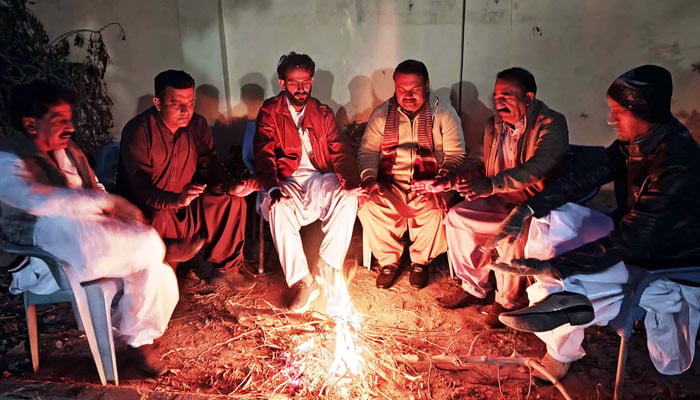Health
Bill for unified ‘digital ID’ to be tabled in NA today
字号+ Author:Smart News Source:Business 2025-01-10 21:27:40 I want to comment(0)
• Legislation envisions data from public, private entities being fed into centralised system to improve governance, streamline govt services • Two new entities, National Digital Commission and Pakistan Digital Authority, envisioned to drive transformation plan • National Forensics Agency Bill, passed by Senate, also on today’s NA agenda KARACHI: The government plans to present a bill in the National Assembly today (Monday) to create a digital identity for citizens, with the aim of centralising social, economic, and governance data. The agenda of Monday’s sitting, issued by the National Assembly Secretariat, stated that the Minister of State for IT and Telecommunication, Shaza Fatima Khawaja, will introduce The Digital Nation Pakistan Bill, 2024. The legislation would “provide for the transformation of Pakistan into a digital nation, enabling a digital society, digital economy and digital governance,” the agenda stated. The bill, aimed at digitising the economy and promoting , was approved by the federal cabinet in June. According to sources, the government plans to create two new bodies: the National Digital Commission (NDC), headed by the prime minister, including all four chief ministers and heads of organisations like the State Bank, FBR and PTA; and the Pakistan Digital Authority, to be led by top industry experts. One of the major propositions under the new regime is a digital identity for every citizen. It would include data about an individual’s health, assets and other social indicators. The bill’s objective, as stated by officials, was to improve access to departments managing ID cards, land records, birth certificates and health records. The digitisation effort would also target government departments, which will be given goal-oriented plans to improve services. “The basic objective of this bill is to support the aim of the Global Digital Compact and enable the building of Digital Public Infrastructure [DPI] of Pakistan,” digital expert Habibullah Khan told . Mr Khan, who is also the CEO of Penumbra, a digital design studio, explained DPI as a “stack of technologies” comprising three key digital systems — Digital ID, universal payments interface, and data exchange. The stack enables countries to “accelerate the digitisation” and speed up development efforts by decades, said Mr Khan, who has been involved in DPI research. When asked why new entities are needed to implement this programme when several organisations with similar functions are already operational, Mr Khan said digital transformation of this scale, which involves several regulators, departments and bodies, cannot be done by any one ministry. “Eleven out of the top fifteen countries in the UN’s e-gov index have a supra-ministerial body to lead national digital transformation. This is why these bodies are being created,” he said. He told that the NDC would be “guiding the digital agenda” while the digital authority would execute the plan to build the DPI. “NDC will approve the plan and will ensure executive support at all levels for building these critical digital systems that comprise the DPI.” He said the two supra bodies would lead the planning process, while the implementation would be done by existing organisations. “For example, Digital ID will still be Nadra’s purview, but it will be upgraded and linked to the Data Exchange Layer and the universal payments interface,” Mr Khan explained. Similarly, Nadra, FBR, SECP, SBP, power distribution companies, banks, etc., would feed data to the stack. One of the propositions is to speed up the formalisation of the economy through digital wallets. It will help people to secure bank loans and become part of government schemes, according to sources. Mr Khan said these initiatives would ensure “equitable access, inclusion of the poor, minorities and women, and creates a robust competitive white economy”. The move would “aggressively expand” access to education and healthcare and connect people to economic opportunity while also increasing digital payments. The plan also envisages a ‘civic lab’ to “encourage young people to harness their tech potential”. The lab would support AI-based startups working in healthcare, educational technology, agricultural technology, and climate change, sources added. The new digital ID programme will be along the same lines as the initiatives implemented in the UAE, India and Estonia. Estonia, which is considered a global success in implementing the digital ID programme, has made electronic ID or eID cards mandatory for every citizen. The system is based on a personal ID code used to access various services like the police, health authorities, population register, ID and telecom service. Since the implementation of the e-ID scheme in 2002, services like voting, health records, residency permits and marriage have been made digital. A similar digital system is operational in the UAE under the name of ‘UAE Pass’, which enables citizens and residents access to services offered by “12,000 government, semi-government and private sector entities” and allows them to digitally sign documents. But digital rights experts have called for more clarity on how the government intends to secure the centralised data system. Asad Baig, a digital rights expert, appreciated the idea, but called for a multi-stakeholder discussion with digital rights organisations, academia and other entities. “This kind of legislation, when it is related to digital identity, needs to be in a multi-stakeholder format. It can’t be pushed through the parliament in haste.” Meanwhile, Mr Khan told that the data stack would “give people the power of consent on who can use their data, creating digital security and negating exploitation”. As per the agenda for today’s NA session, the National Forensics Agency Bill, 2024, which has already been by the Senate, will be laid before the lower house.
1.This site adheres to industry standards, and any reposted articles will clearly indicate the author and source;
 Related Articles
Related Articles-
کراچی کے اسکول موسم سرما کی چھٹی کے بعد آج دوبارہ کھل رہے ہیں۔
2025-01-10 21:07
-
حکومت نے عمران خان کی ’’ایگزیکٹو آرڈر‘‘ کے ذریعے رہائی کی امکان کو مسترد کر دیا ہے جبکہ پی ٹی آئی کا کہنا ہے کہ بات چیت کی کامیابی ’’سب کے لیے انصاف‘‘ پر منحصر ہے۔
2025-01-10 20:16
-
حکومت نے پی ٹی آئی سے مذاکرات کی آخری تاریخ 28 فروری تک بڑھانے کا مطالبہ کیا ہے۔
2025-01-10 19:58
-
حکومت سے مذاکرات کا کوئی فائدہ نہیں، جسے مینڈیٹ حاصل نہ ہو، اچکزئی نے پی ٹی آئی کو بتایا۔
2025-01-10 18:49
 User Reviews
User Reviews Recommended Reads
Recommended Reads Hot Information
Hot Information- After historic ODI victory, Pakistan set for South Africa Tests challenge
- حکومت نے پی ٹی آئی سے مذاکرات کی آخری تاریخ 28 فروری تک بڑھانے کا مطالبہ کیا ہے۔
- اہم پی ٹی آئی رہنماؤں کا کہنا ہے کہ پاکستان کے لیے حکومت مخالف مذاکرات کی ضرورت ہے۔
- پاکستان نے دو سالہ اقوام متحدہ سلامتی کونسل کی مدت کا آغاز کیا، کشمیر اور افغانستان کی امن کے لیے اپنی وابستگی کا اعادہ کیا۔
- After historic ODI victory, Pakistan set for South Africa Tests challenge
- کُرَّم کے حملہ آوروں کو بنکروں کی تباہی کے بعد دہشت گردوں کی طرح پیش آیا جائے گا۔
- پاکستان نے دو سالہ اقوام متحدہ سلامتی کونسل کی مدت کا آغاز کیا، کشمیر اور افغانستان کی امن کے لیے اپنی وابستگی کا اعادہ کیا۔
- گلگت بلتستان کو 2025 میں سیاحت کے لیے مقبول ترین مقامات میں شامل کیا گیا۔
- Newcastle's Isak, Joelinton leave Manchester United with 4th consecutive loss
 Abont US
Abont US
Follow our WhatasApp account to stay updated with the latest exciting content












